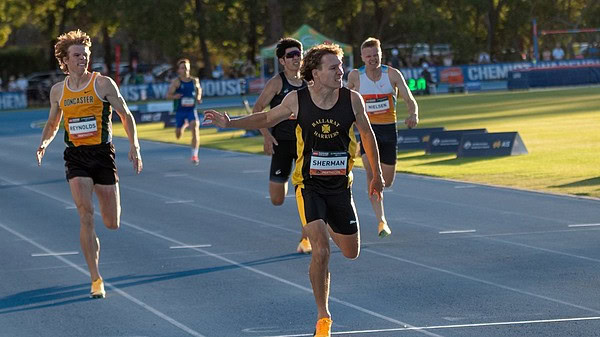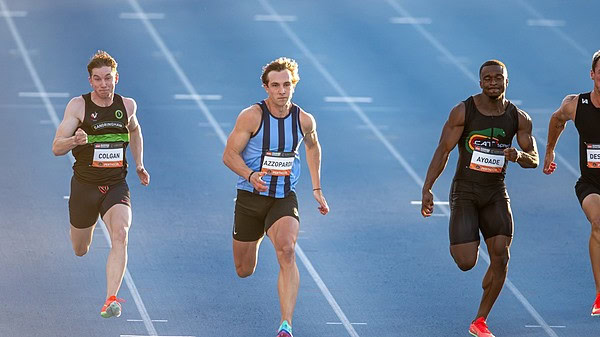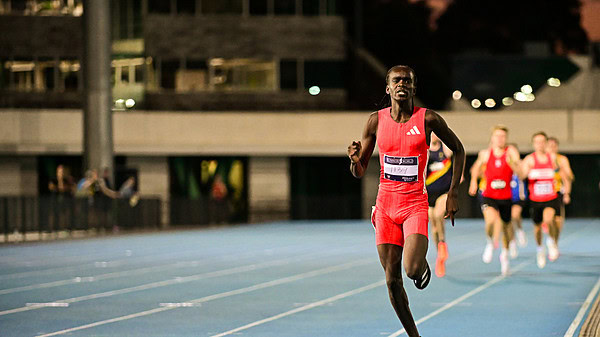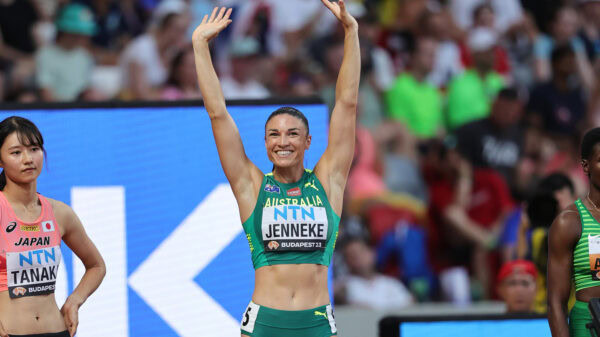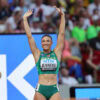The world’s fastest man, Fred Kerley, electrified Lakeside Stadium with a dominant win at the inaugural Maurie Plant Meet in Melbourne.
Running in the Peter Norman 200m Kerley pulled away from the field over the final 50 metres and saluted the crowd with 20 metres to go, on the way to a winning time of 20.32 seconds.
Kerley’s performance was one of nine track records set in front of a bumper crowd of over 6,000 spectators. Undoubtedly, the atmosphere was the best ever seen at Lakeside for a high performance meet, and approached the enthusiasm of the defunct Nitro Athletics entertainment product. 
“The conditions were good, I enjoyed myself. [Breaking the 20 seconds barrier] would have been easy, but hey,” said Kerley.
“I got unfinished business in the 200m, so just to come and race, enjoy myself and have fun doing things right.” 
Olli Hoare showed his class in the John Landy Mile, running from the front after the pacemaker dropped out and kicking away for a 3:52.24 win from New Zealand’s Sam Tanner (3:53.83) and 16-year-old Cameron Myers (3:55.44).
“This is why I came home,” said Hoare, whose 3:36.70 1500m split en route was also the fastest ever run at Lakeside Stadium.
“I want people to be excited about athletics like an event that the best in the world can come and watch and Melbourne, Lakeside Stadium and Athletics Australia have all made it pay off.” 
Myers’ run reset the record books, breaking the Australian junior record of 3:56.87 set by Michael Hillardt in 1980. Only Olympic champion Jakob Ingebritsen has broken four minutes for the mile at a younger age, and only by nine days.
“I mean to come in and do it in a meet like this in front of the biggest crowd you can get at an athletics meet in Australia is pretty unreal,” Myers said.
It was a night for records, but pesky headwinds denied what otherwise could have been more, had wind been slightly more favourable. That said, conditions were otherwise perfect for athletics. 
In the women’s 100m Naa Anang shot to equal sixth on the Australian all-time list with 11.20 second clocking into a 1.4 m/s headwind.
“I’m so stoked, I mean I surprised myself in Adelaide I didn’t really think I was in that shape this early, so I normally open up and get better, so I was pretty expectant for tonight. I was also very nervous because I put a lot of pressure on myself. I am glad I could back myself and come through, so I’m really stoked,” said Anang.
“For anyone that doesn’t know, I have had a long-term injury, so I have stress fractures still in both of my shins and had that for the last three years. It’s just meant that training has had to be super modified. This off-season was perhaps the first time in a long time that I actually was able to train every day consistently. That’s what I put it down to, and my coach Gary [Bourne] pushing me to run further distances than I would like, but it is working out.”
| Rank | Time | Athlete |
| 1 | 11.11 (+1.9) | Melissa Breen |
| 2 | 11.12 (+1.9) | Melinda Gainsford-Taylor |
| 3 | 11.14 (+1.4) | Sally Pearson |
| 4 | 11.16 (+1.8) | Hana Basic |
| 5 | 11.19 (+1.6) | Kerry Johnson |
| 6 | 11.20 (+1.2) | Raelene Boyle |
| 6 | 11.20 (-1.4) | Naa Anang |
| 8 | 11.24 (+1.4) | Colleen (Beasley) Pekin |
| 8 | 11.24 (+1.1) | Cathy Freeman |
| 10 | 11.25 (+0.1) | Ella Connolly |

Michelle Jenneke carried her strong indoor hurdling form to the outdoors, bettering the World Championship qualifying standard with a 12.75 second win (+1.2).
“I had four competitions over there. That was 8 races in 2 weeks which is awesome,” said Jenneke of her indoor racing.
“The only time I raced indoors previously was at world indoors so I only had 3 races under my belt and got a lot more experience over there.
“It’s just something I wanted to do and we focused more on the back end of my race before we went overseas and then we used those couple of weeks on the start in the hope we would put it all together in this race. Which I think was pretty effective.” 
One of the contests of the night was the women’s 1500m, with Australian record holder Jess Hull just holding off a spirited challenge from Abbey Caldwell down the home straight. The pair ran 4:07.11 and 4:07.32 respectively – the fastest two runs ever at Lakeside.
“Yeh it was fun, I mean it its different to race and like not be like when it is just trying by a time trial,” said Hull
“To have the crowd and to be able to feel her pushing me and kind of just go through the gears and try and see what I had, it’s pretty incredible to have Abbey bring out the best in it tonight.
“She kind of took it on a lot further out then I thought she would so yeh gutsy run from her and I’m excited for some battles in the next few weeks.” 
A second round leap of 6.71m set the early benchmark in the women’s long jump. It wasn’t from either Olympic finalists in the field – USA’s Tara Davis-Woodhall or Brooke Buschkuehl – but 21-year-old Samantha Dale. It would be the winning performance, with Davis-Woodhall twice jumping 6.69m and Buschkuehl 6.59m.
Dale relished the international standard competition.
“It was exciting, it’s exciting to have Tara over here and it’s good for the sport. You don’t really have internationals come to for long jump over here, so it’s very exciting to have Tara here and especially at her level she is a really good jumper internationally,” said Dale.

Chris Mitrevski recorded the largest ever long jump at Lakeside Stadium, albeit wind-assisted. Opening the competition with an 8.02m (+2.2) jump, Mitrevski went out to 8.16m (+3.9) in the second round. 
Stewart McSweyn paid homage to the late Maurie Plant – whom this Melbourne Track Classic meet was renamed after – by donning original Melbourne Track Club kit. But more so, McSweyn didn’t die wondering, following the early pace and running from the front in the 3000m. Recently crowned World U20 Cross Country champion Ishmael Kipkirui was too good for McSweyn in the end, running to victory in 7:41.38 to 7:44.36.
“It’s a night to honour Maurie Plant not only in Australia but around the world. I am wearing the original kit, he was a big part of making it back in 1997 so I finally got it out of the wardrobe and hopefully did it proud,” said McSweyn.
“Maurie always said he would prefer you to go out and lose than sit back and do nothing, he used to love people who raced like that and that’s what I try to do.
“He was definitely one of my greatest mentors and I don’t know if I would have achieved as much as I have without Maurie’s help.” 
Also backing up from Bathurst was Ethiopia’s junior women’s victor, Senayet Getachew, who ran to an 8:46.54 victory in the 3000m from Uganda’s Prisca Chesang and Japan’s Nozomi Tanaka. 
Nicola Olyslagers was peerless in the high jump. Entering the competition at 1.87m the Olympic silver medallist cleared 1.87m and 1.90m on her first attempt, and made 1.93m on her second, before bowing out of the competition at 1.97m. 
In other events:
- Jacob McCorry sped to a new personal best of 13.66 seconds (+0.9) in winning the 110m hurdles from Mitch Lightfoot (13.84) and Nick Andrews (13.90)
- Australia’s fastest man, Rohan Browning, claimed the 100m in a mature display, finishing over the top of New Zealand’s Eddie Osei-Nketia by one-hundredth-of-a-second in 10.26s (-1.7)
- France’s Loga Rose set a meet record in the hammer throw with a 69.31m performance
- Ella Conolly backed up her second place in the 100m (11.30s) to win the 200m in 23.28 (-1.5) from Torrie Lewis (23.31)
- New Zealand’s James Preston (1:45.85) and Brad Mathas (1:46.00) timed their run to the line perfectly in the 800m, overtaking a tiring Australian field after a fast 50 second first lap
- France’s Felise Vahai Sosaia (82.04m) and New Zealand’s Tori Peeters (59.00m) took out the men’s and women’s javelin
- Chad Perris (T13) took out the AWD 100m in 10.81 seconds (-0.1).
An updated list of Lakeside Stadium track records is available at aths.au
Photo Gallery

A gallery of over 200 photos from the Maurie Plant Meet – Melbourne is available.
Free downloads when you subscribe to our newsletter.
Please tag us @insideaths when you share our photos on socials.


